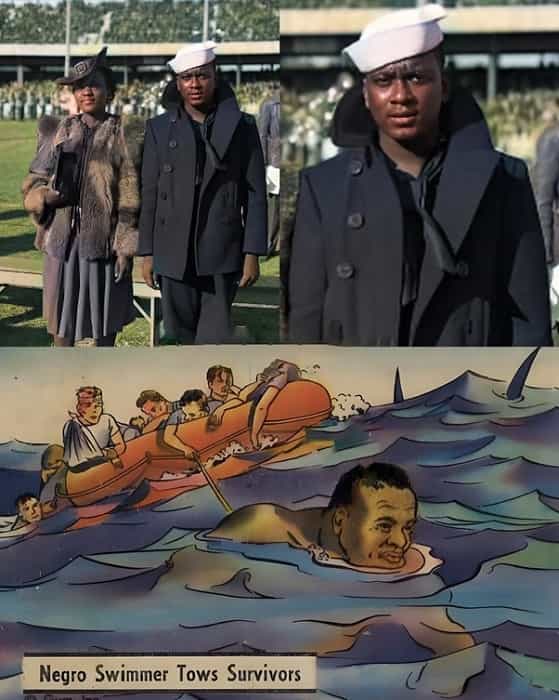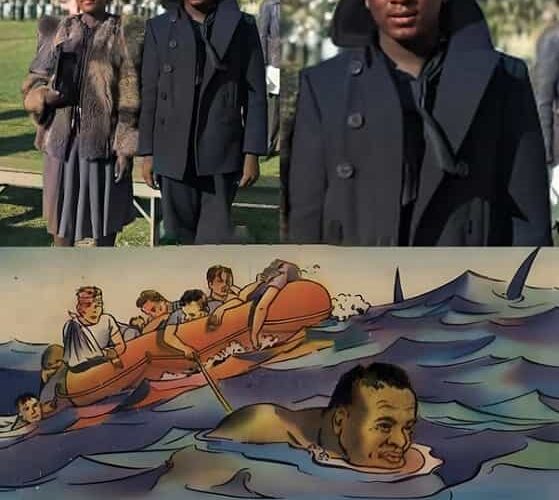How One Sailor Saved His Entire Crew: The Heroic Journey of Charles Jackson French

Memorial Day is a time to honor and remember the brave men and women who have served our country. While many heroes are celebrated, some stories remain untold or overlooked.
One such hero is Charles Jackson French, an African American sailor whose incredible bravery during World War II deserves to be remembered and celebrated. His story is one of courage, selflessness, and determination, and it serves as a powerful reminder of the contributions of African Americans in the military.
The Heroism of Charles Jackson French
The story of Charles Jackson French first came to light on October 21, 1942, during a radio broadcast on NBC. The program, called It Happened in the Service, shared stories of bravery and sacrifice from the front lines of World War II. On that day, the host introduced Ensign Robert Adrian, a naval officer who had survived a devastating battle in the Solomon Islands. Adrian’s ship had been attacked by Japanese forces, and his story of survival was nothing short of miraculous. But the true hero of that night was not Adrian—it was Charles Jackson French.
The Night of the Attack
Ensign Adrian was on the bridge of his ship when it was hit by enemy fire. The explosion knocked him unconscious, and when he woke up, the ship was sinking. Despite being injured, with wounds to his legs and shrapnel in his eyes, Adrian managed to escape into the water. As he floated in the ocean, he saw Japanese ships using searchlights and machine guns to target survivors. Amid the chaos, Adrian heard voices and found a life raft filled with wounded sailors. Among them was Charles Jackson French, a mess attendant known simply by his last name, French.
A Selfless Act of Bravery
Adrian quickly realized that the current was pulling the life raft toward a Japanese-occupied island. He knew that if they reached the shore, they would likely be captured or killed. French, the only uninjured person on the raft, volunteered to swim the raft away from the island. Adrian warned him that the task was nearly impossible—the waters were infested with sharks, and the distance was too great. But French was determined. He replied that he was a strong swimmer and was more afraid of the Japanese than the sharks.
Without hesitation, French stripped off his clothes, tied a rope around his waist, and jumped into the water. He instructed the men on the raft to guide him by telling him if he was going the right way. For six to eight hours, French swam through the dark, shark-infested waters, pulling the raft and its wounded passengers to safety. His strength and determination saved the lives of his fellow sailors.
Rescue and Recognition
At sunrise, the group was spotted by an American scout plane. A marine landing craft was sent to rescue them, and they were brought safely behind American lines. French’s incredible act of heroism did not go unnoticed. News of his bravery spread, and he was celebrated as a hero. However, despite his courage, French did not receive the same level of recognition as other war heroes of his time.
A Legacy of Courage
Charles Jackson French’s story is a powerful reminder of the sacrifices made by African Americans in the military. During World War II, African Americans faced discrimination and segregation, both in society and in the armed forces. Despite these challenges, they served with honor and bravery, often going above and beyond the call of duty. French’s actions that night in the Solomon Islands are a testament to his courage and selflessness.
In recent years, there has been a growing effort to recognize the contributions of African American service members. In 2020, the U.S. Navy announced that it would name a new aircraft carrier after Doris “Dorie” Miller, another African American hero of World War II. This was a significant step forward, but there is still more work to be done. Charles Jackson French’s story deserves to be told and celebrated, not just during Memorial Day but throughout the year.
Why We Must Remember
Memorial Day is more than just a long weekend or the unofficial start of summer. It is a time to reflect on the sacrifices made by those who have served our country. Stories like Charles Jackson French’s remind us of the bravery and resilience of the men and women who have fought for our freedom. They also highlight the importance of recognizing and honoring the contributions of all service members, regardless of their race or background.
Charles Jackson French’s heroism is a shining example of the best of humanity. In the face of danger, he put the lives of others before his own and demonstrated extraordinary courage. His story is one that should inspire us all and serve as a reminder of the power of selflessness and determination.
As we celebrate Memorial Day, let us take a moment to remember Charles Jackson French and the countless other heroes who have served our country. Their stories remind us of the cost of freedom and the importance of honoring those who have sacrificed so much. Charles Jackson French’s bravery in the waters of the Solomon Islands is a story that deserves to be told and remembered. It is a story of courage, resilience, and the enduring spirit of service. Let us ensure that his legacy lives on, not just on Memorial Day, but every day.
Frequently Asked Questions (FAQ) About Charles Jackson French and His Heroism
1. Who was Charles Jackson French?
Charles Jackson French was an African American mess attendant in the United States Navy during World War II. He became a hero after saving the lives of his fellow sailors during a battle in the Solomon Islands in 1942.
2. What did Charles Jackson French do to become a hero?
During a battle in the Solomon Islands, French’s ship was attacked and sunk by Japanese forces. After escaping into the water, he found a life raft filled with wounded sailors. Despite the danger of sharks and enemy forces, French tied a rope around his waist and swam for 6 to 8 hours, pulling the raft to safety. His actions saved the lives of his shipmates.
3. Why is Charles Jackson French’s story important?
French’s story is important because it highlights the bravery and selflessness of African American service members during World War II. At a time when racial discrimination was widespread, French’s heroism demonstrated the courage and dedication of Black sailors who served their country despite facing inequality.
4. Did Charles Jackson French receive any awards for his actions?
While French was celebrated as a hero at the time, he did not receive the same level of recognition or awards as some of his white counterparts. His story has gained more attention in recent years as efforts have been made to honor the contributions of African American service members.
5. How did the public learn about Charles Jackson French’s heroism?
French’s story was first shared on a popular radio program called It Happened in the Service on October 21, 1942. Ensign Robert Adrian, a survivor of the attack, recounted the events and praised French’s bravery.
6. What challenges did African American service members face during World War II?
African American service members faced significant challenges during World War II, including segregation, discrimination, and limited opportunities for advancement. Despite these obstacles, many, like Charles Jackson French, served with distinction and courage.
7. Has Charles Jackson French been officially recognized by the U.S. military?
While French was celebrated during the war, he has not received the same level of official recognition as some other World War II heroes. However, there is growing interest in honoring his legacy, and efforts are being made to ensure his story is remembered.
8. Why is Charles Jackson French’s story relevant today?
French’s story is relevant today because it reminds us of the importance of recognizing and honoring the contributions of all service members, regardless of race or background. It also serves as an inspiration for courage, selflessness, and resilience in the face of adversity.
9. Are there any memorials or tributes to Charles Jackson French?
As of now, there are no major memorials or tributes specifically dedicated to Charles Jackson French. However, his story is increasingly being shared in books, articles, and educational programs to ensure his heroism is not forgotten.
10. How can we honor Charles Jackson French’s legacy?
We can honor Charles Jackson French’s legacy by sharing his story, advocating for greater recognition of African American service members, and supporting efforts to commemorate their contributions. Teaching his story in schools and including it in historical narratives are also important steps.
11. What can we learn from Charles Jackson French’s actions?
Charles Jackson French’s actions teach us about the power of selflessness, courage, and determination. His willingness to risk his life to save others, even in the face of overwhelming danger, is a powerful example of heroism and humanity.
12. How does Charles Jackson French’s story connect to Memorial Day?
Memorial Day is a time to remember and honor those who have served and sacrificed for our country. Charles Jackson French’s story is a reminder of the bravery and sacrifices made by service members, particularly those whose contributions have been overlooked or underrecognized.
13. Are there any books or documentaries about Charles Jackson French?
While there are no major books or documentaries solely focused on Charles Jackson French, his story is included in broader works about African American heroes of World War II. Researchers and historians are working to bring more attention to his life and legacy.
14. What role did African Americans play in World War II?
African Americans played a vital role in World War II, serving in all branches of the military and contributing to the war effort both on the front lines and at home. Despite facing segregation and discrimination, they demonstrated exceptional bravery and dedication.
15. How can I help raise awareness about Charles Jackson French?
You can help raise awareness by sharing his story on social media, discussing it with friends and family, and supporting organizations that work to preserve and promote the history of African American service members. Writing to local representatives or military organizations to advocate for his recognition is another way to make a difference.

